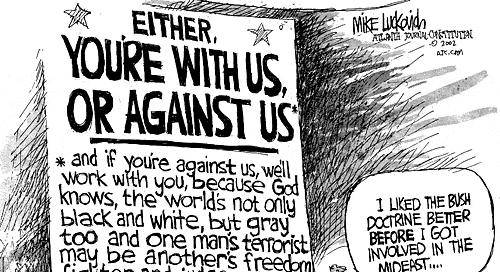'Whoever is not against us is for us': The Bush Doctrine was Jesus, in reverse
A Christian president twisted the words of Jesus to make the case for forever war. Why didn't anyone say so?
"A coalition partner must do more than just express sympathy, a coalition partner must perform," Bush said. "That means different things for different nations. Some nations don't want to contribute troops and we understand that. Other nations can contribute intelligence-sharing. ... But all nations, if they want to fight terror, must do something."
Bush said he would not point out any specific countries in his speech.
"Over time it's going to be important for nations to know they will be held accountable for inactivity," he said. "You're either with us or against us in the fight against terror." — President George W. Bush announces the “Bush Doctrine,” Nov. 6, 2001
“You’re either with us or against us” is a bold sentiment for an American president. Two decades later, America’s allies might take us up on that ultimatum.
But in the months after 9/11, We Were All Americans. We were all in it together. And “all the world’s nations” needed to pitch in.
President Bush used those sympathetic moments to bang the drums of war against Afghanistan and, incredibly, Iraq, which had no nexus to the terror attack.
Bush did not want pushback. He wanted a “coalition of the willing,” or at least willing to shut up in public as it contributed privately.
What some called a “faith-based foreign policy” was, in fact, a war of choice in Iraq.
After the Iraq War began, a May 2003 Christianity Today story quoted Bush’s commerce secretary Don Evans: "It's love your neighbor like yourself. The neighbors happen to be everyone on the planet."
Imagine talking about war that way.
“Teacher,” said John, “we saw a man driving out demons in your name and we told him to stop, because he was not one of us.
“Do not stop him,” Jesus said. “No one who does a miracle in my name can in the next moment say anything bad about me, for whoever is not against us is for us.” — Mark 9:38-40
As political messaging, the Bush Doctrine — “you’re either with us, or against us in the fight against terror” — was cynical and disturbing. (Well, one of the Bush doctrines. This piece argues persuasively there were four.)
Worse, Bush was twisting the words of Jesus to make the case for mission creep and forever war.
By Mark 9, Jesus and the disciples needed all the allies they could get.
The inner ring around them was an established Jewish order, which did not take kindly to Jesus. Beyond that inner ring, it was a pagan culture. The Jesus people were a minority within a minority.
So when told of a man driving out demons, in Jesus’s name, Jesus did not see any downside.
Jesus did not claim the power as his, exclusively. He was not concerned with earthly position, as John was. John wanted Jesus and the disciples to hold an exalted status among men, respected as wise healers. He didn’t want hobbyists joining them. Jesus had bigger concerns.
That unnamed man was arguably the first Christian. The disciples followed Jesus on his path, but this man followed Jesus in his ways.
“Whoever is not against us is for us” is the talk of a man building a movement that would outlive him.
So Jesus was heartened to see someone following in his example.
Not because he needed human allies. His life path was to be killed, and resurrected. He predicted it himself.
“He (Jesus) then began to teach them that the Son of Man must suffer many things and be rejected by the elders, chief priests and teachers of the law, and that he must be killed and after three days rise again,” reads Mark 8:31.
The suffering was the point, and was not to be avoided.
No, Jesus did not need men to fight men, or to pull him off the cross someday. Earthly battles were not his concern.
Jesus needed people to carry on the mission after he was gone, and when he was not around.
A man the disciples knew not, casting out demons in Jesus’ name, was the sign of a movement growing bigger than one man, or twelve followers. And it’s a good thing, too, because one of the twelve, Judas Iscariot, was “against us” after all.
So when Jesus heard of the man who joined him in fighting demons, he was pleased, not territorial. It meant the kingdom of God was growing.
“Anyone who gives you a cup of water in my name because you belong to Christ will certainly not lose his reward,” Jesus tells John in Mark 9:34.
I have argued that pastors and the church let us down in 2020. They followed man’s law, not God’s word. They acted from “an abundance of caution,” not faith. At the time people needed them most, churches closed their doors.
But the lack of pushback to the Bush Doctrine means churches have been letting us down for decades.
Bush and Jesus both built coalitions. Jesus wanted his to cast out demons. Bush wanted his to remove a national leader he didn’t like. The same words, with a twist, produced much different outcomes.
I have warned against the false teachings of Fortune Cookie Jesus. This is the Jesus of your liberal friends’ imaginations, who leads a Seattle grunge band and performs kumbaya. Well, Forever War Jesus was even more dangerous.
This is why we read the word. So when someone twists it, we know. We will see something, and can say something.
Where were our faith leaders, when a president twisted the words of Jesus to justify war?





